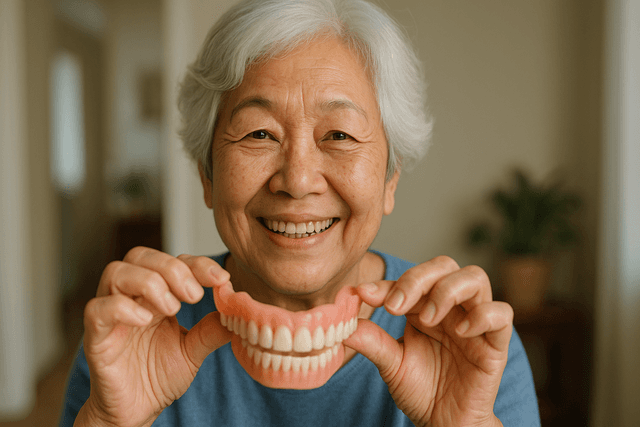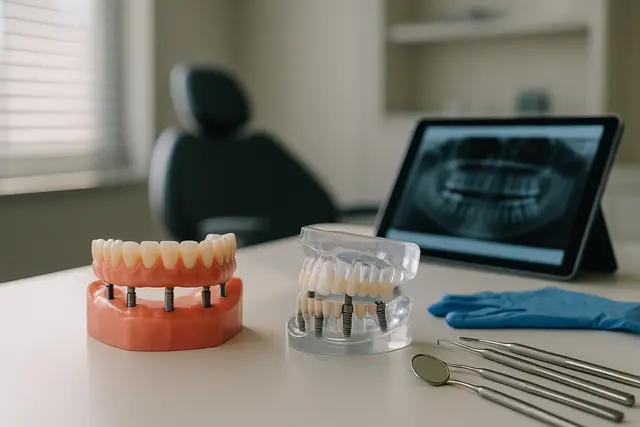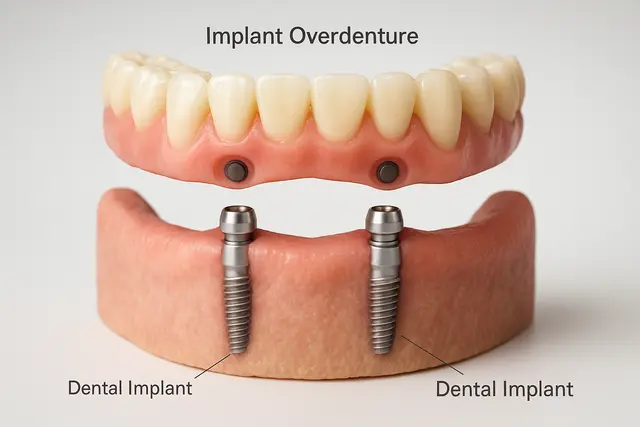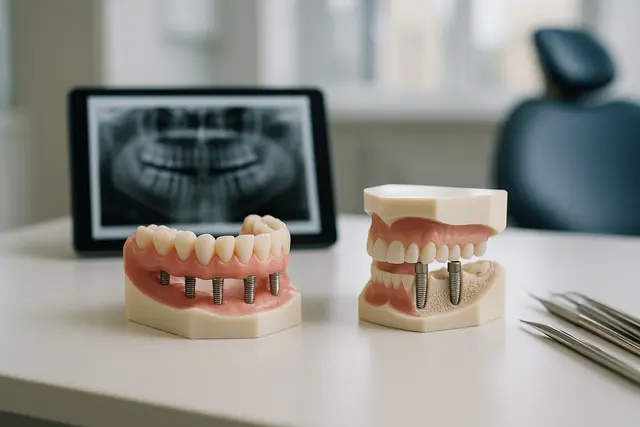Prosthodontics
5 min read
Sep 21, 2025
Are Dentures Bad for Long-Term Oral Health? Tips for Preserving Oral Wellness
Thinking about dentures, or already wearing them, and wondering what they mean for your long-term oral health? Dentures aren’t inherently bad, but their impact depends on fit, hygiene, and regular dental care.

So, you’ve got dentures, or you’re thinking about getting them. Maybe your dentist mentioned them with a reassuring smile, or maybe your natural teeth just aren’t what they used to be. Either way, you’re wondering: are dentures secretly messing with your mouth in the long run?
Great question. The short answer? Not necessarily, but how you wear dentures, clean them, and care for your gums plays a huge role in whether they help or hurt your oral health for years to come.
Denture Basics and Why They Matter
Dentures are removable oral appliances that replace an entire row of missing teeth or just a few gaps here and there. Whether you’re rocking full dentures or partial dentures, they’re designed to restore function and appearance. That means smiling without hesitation, eating your favorite foods again, and not mumbling your way through dinner parties.
But like anything artificial, dentures need proper care, and if they’re ignored or ill-fitting, they can increase the risk of oral problems that sneak up over time.
What Happens When You Wear Dentures Every Day
Now, don’t panic. You’re supposed to wear dentures if you’ve lost teeth. They help keep your jawbone aligned, let you chew properly, and prevent that sunken facial look no one asked for. But dentures can cause discomfort if they don’t fit right, or if they’re not cleaned often. And poorly fitting dentures? They’re not just annoying, they can cause sore spots, gum irritation, and even infections like stomatitis.
Dentures typically rest on your gum tissue, and if they shift or rub, they can lead to inflammation. If you're leaving dentures overnight (guilty?), that can increase the risk of oral infections and give bacteria time to throw a party in your mouth.
When Your Dentist Becomes Your Best Friend
It might not be love at first appointment, but regular visits to your dentist are key. They’ll make sure your dentures fit well, check for any signs of irritation, and help you avoid complications like gum disease or oral cancer. Since dentures sit on soft tissue, changes in your mouth over time (hello, bone resorption) mean your dentures may need adjusting. That’s normal. It’s not a sign of failure, it’s just maintenance.
Seeing your dentist also helps catch issues early, like if your partial dentures are putting stress on your remaining natural teeth or if your complete denture isn’t supporting your jaw like it should.
Why Oral Hygiene Is Still a Big Deal
Just because you’ve swapped some natural teeth for artificial teeth doesn’t mean you’re off the hook. Oral hygiene is still mission-critical. Food particles can get trapped under your dentures, which not only causes bad breath but can also lead to infections and poor oral health.
Clean your dentures daily. Rinse them after eating, soak them overnight, and brush them gently to prevent buildup.
And yes, still brush your gums, tongue, and any remaining teeth.
Keep your mouth moist with plenty of water and watch out for signs of dry mouth, which can increase the risk of oral problems.
Regular oral hygiene habits protect both dentures and gums.
Alternatives to Dentures
Traditional dentures work well for many people, but they’re not the only option. If you’re dealing with loose dentures or tired of the upkeep, dental implants might be a better long-term choice. They fuse to your jawbone, encouraging bone growth and stability. Implant-supported dentures, for example, provide a secure fit, don’t shift around when you talk or chew, and help preserve your jawbone better than traditional removable dentures.
It’s not about saying dentures are bad, it’s about knowing your options and choosing what works for your lifestyle, oral condition, and budget.
The Trouble With Ill-Fitting Dentures and Bone Loss
Here’s where the real damage can start: ill-fitting dentures. When dentures don’t sit right, they can lead to bone loss, especially in the lower jaw. This bone resorption changes the shape of your gums and face over time, making it even harder for dentures to fit comfortably.
That’s why your dentures need regular checkups too. Adjustments, relines, or even a new set of dentures may be needed every few years. It’s all part of keeping your mouth happy.
How to Keep Dentures Fit and Comfortable
Dentures to fit your mouth well shouldn’t slip when you talk, laugh, or chew. If they do, call your dentist. Don’t try DIY fixes with glue or duct tape (seriously). Instead, follow proper care routines and avoid leaving dentures out to dry, which can warp their shape. Wearing removable dentures with care means storing them properly, handling them gently, and treating them like the medical devices they are, not just “false teeth.”
And if you’ve just received new dentures, give your mouth time to adjust. It’s totally normal to have a break-in period. Stick with soft foods, stay hydrated, and use recommended adhesives if needed.
Gum Irritation and Other Red Flags
Some irritation is common when you first get dentures, but ongoing gum irritation isn’t something to ignore. Redness, swelling, or sore spots may signal a problem. Dentures can lead to pressure sores, or worse, increase the risk of oral infections if bacteria gets trapped. The fit of your dentures really does impact your overall health.
And if you’re noticing things like bad breath, pain while chewing, or a strange taste, don’t wait, get back to your dentist for a checkup.
What Denture Wearers Can Do for Long-Term Oral Health
If you wear dentures, long-term oral health is absolutely possible. It just takes consistency. Here are a few habits to make second nature:
Clean your dentures daily and rinse them after meals.
Brush your gums and any remaining natural teeth.
Stay on top of regular dental visits, even if you think everything’s fine.
Keep your mouth moist and avoid smoking or drinking too much alcohol.
Get replacements or adjustments as needed. Dentures aren’t forever.
Are Dentures Bad for Your Oral Health in the Long Run?
Not necessarily. Dentures themselves aren’t harmful, but problems arise if they don’t fit well or aren’t cleaned properly. Ill-fitting dentures can cause sore spots, gum irritation, and even bone loss, while poor hygiene may lead to infections. With proper fit, regular dental checkups, and good daily care, dentures can support oral health for many years.
Why Should You Avoid Sleeping With Dentures?
Wearing dentures overnight increases the risk of gum irritation, bacterial buildup, and infections like stomatitis. Your gums need time to rest, and keeping dentures in while you sleep prevents that recovery. Removing them at night also reduces the chance of trapping food particles and helps maintain better long-term gum and bone health.
How Can You Prevent Problems With Dentures?
Consistency is key. Clean your dentures daily, rinse them after meals, and soak them overnight in a safe solution. Brush your gums, tongue, and any remaining natural teeth to maintain good oral hygiene. Schedule regular dentist visits to adjust or replace dentures when needed. Staying proactive helps prevent discomfort and complications like bone loss or infections.
What Alternatives to Traditional Dentures Exist?
Dental implants and implant-supported dentures are popular alternatives. Implants fuse to the jawbone, providing stability and helping to preserve bone structure. Implant-supported dentures offer a more secure fit than removable ones, preventing slipping and making chewing and speaking easier. These options may cost more upfront but often provide greater comfort and long-term oral health benefits.
Read Next
Related Posts

Prosthodontics
Implant Supported Dentures Overview
Missing teeth can impact more than just your smile, they can affect your confidence, comfort, and even your diet. Fortunately, modern dentistry offers a solution that’s both secure and natural-looking: implant-supported dentures. This innovative approach blends the stability of implants with the convenience of dentures to create a long-lasting, life-improving upgrade.
5 min read
Oct 29, 2025

Prosthodontics
Implant Overdentures Explained: The Hybrid Solution to Missing Teeth
Missing teeth can impact everything from your ability to eat to your self-confidence. While traditional dentures have long been a go-to solution, they often fall short in comfort and stability. Implant overdentures offer a modern alternative that combines the security of dental implants with the convenience of removable dentures, a true upgrade for those looking to reclaim their smile.
6 min read
Oct 29, 2025

Prosthodontics
Implant Retained Dentures Explained
Considering implant-retained dentures? You're not alone. As modern dentistry evolves, more people are turning to this secure, natural-feeling alternative to traditional dentures. This guide will walk you through what they are, how they work, and why they might be the solution you've been looking for.
4 min read
Oct 28, 2025
Don’t have time to research every dentist around you?
See why 30k+ patients trusted us